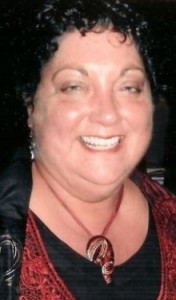Click here to contact this member
My name is Annie, and I live in Canberra, Australia. I am married with three adult sons; taught high school and college science, math, health, outdoor education, and social sciences; and then moved into the Australian Public Service. In November 2009, my primary care physician (PCP) called me with the best news I had had in years: “The bad news is we think you may have Cushing’s disease; the good news is that it is curable!” Suddenly, all of the physical and psychological ups and downs of the past 4 years fell into place.
I have always been fit and healthy, apart from the usual ongoing battles with weight. In addition, I played netball and basketball in local competitions until I was 45, when muscle and bone injuries began. I also walked for exercise. In 2005–2006, I started putting on serious weight. From being a reasonable 80 kilograms (kg), my weight increased to over 95 kg. I consulted a nutritionist to help me lose weight. I began to have problems walking. I injured my Achilles tendon and repeatedly tripped and fell. It seemed like every time I attempted exercise, I would injure myself. I also began to have “hormonal” symptoms, such as heavy periods, flushing,
acne, headaches, sweating, excessive thirst, and frequent urination, but my hormone levels, including thyroid, were normal. My blood tests showed high cholesterol, and I developed high blood pressure, so I started medication to control these.
In 2008, I started a very stressful job, working long hours and was not really exercising much. I continued to have bleeding problems, and asked the PCP for a referral to a gynecologist, because I wanted to have a hysterectomy. The gynecologist did a thorough medical history and suggested my problems were actually related to polycystic ovarian syndrome (PCOS), which causes insulin problems; this is treated with the diabetic drug, metformin, to control blood sugar levels. She also gave me Meprazol (omeprazole) for my reflux problems and suggested a Mirena IUD (levonorgestrel-releasing intrauterine device) to treat the excessive bleeding rather than a hysterectomy. My periods stopped altogether in late 2008. I was excited! The gynecologist told me that all of my symptoms, including the weight gain, were not my fault. I went back to the nutritionist with this information, so we could consider it when addressing my weight. My blood pressure medication was increased and changed. However, when I returned to work, my colleagues started noticing other physical symptoms. I was bruising and bleeding a lot; my hair and skin had thinned; I was sweating profusely; and my legs and feet had started to swell. I had lots of facial hair and was suffering from incontinence. I researched possible side-effects of my medications in an attempt to identify the reasons for my health woes. My PCP also referred me to a psychologist to help me with the chronic stress and anxiety. The psychologist helped me address a range of issues that had been building up in my life.
In December 2008, I went on sick leave and again went to see my PCP, who was concerned about my anxiety and agitation. She prescribed Seroquel (quetiapine fumarate), a mood stabilizer. When I couldn’t sleep, I was prescribed a sleeping pill. I was terrified. I didn’t know what was happening to me. I was extremely anxious. Although I had been getting medical assistance from my psychologist and PCP, my life still seemed to be spiraling out of control. I didn’t want to take sleeping pills because I was worried about overdosing. While I wasn’t suicidal, I was getting very confused in my thinking. I was becoming paranoid and didn’t trust my family to care for me. I just wanted to be left alone.
On Christmas Day 2008, I was very agitated and scared. I locked myself in my room and called my friend. I needed help. My friend, a nurse, said she would come get me if I agreed to go to a psychiatric hospital, where I stayed until the end of January 2009. I had suffered from depression previously due to stressful life events but had never experienced anything like this particular episode. After many weeks of trial medications, I was diagnosed as being “bipolar” and put on Epilim, an anti-epileptic drug. My euphoria/psychosis was seen as part of a “typical bipolar crisis/episode.”
I did not go back to work for another 3 months. The physician said it was usual for patients to take many months to recover from a bipolar episode. My brain was fuzzy. I couldn’t concentrate, and I was in shock. I made an appointment with a psychiatrist to assist in managing my illness. He changed my medication back to Seroquel, and over time he adjusted the dosage so that I could cope better with work and life.
In April 2009, I developed the first of many serious infections, leading to cellulitis in my leg. Later that year, I got a tooth abscess that would flare up regularly, requiring strong antibiotics. After 12 months of these infections, I had the tooth extracted. Over the next 2 years, I had several episodes of cellulitis. I also had a persistent skin infection on my leg, including a warty rash that was spreading (tinea versicolor, a common infection with Cushing’s patients). My mobility was deteriorating with inflamed legs and feet and worsening edema. I was increasingly using a cane to walk any distance. I was also getting weaker. I couldn’t lift heavy objects, dig in the garden, climb stairs, or open jars.
I returned to work gradually. Because I had been diagnosed with a mental health illness, I was on severe restrictions regarding hours of duty and the activities I was allowed to perform. My concentration and memory suffered, and it took a long time for me to again perform tasks at my previous level of proficiency. Because of my poor health and myriad symptoms, I lost confidence in my abilities and pulled back from meetings and conferences as travel and social “mingling” were difficult. I also felt very self-conscious about my appearance.
In 2009, I was sent for my first colonoscopy and gastroscopy. My physician spoke to me as I was being given anesthetic for the procedure. He was concerned at the range of medical problems I had listed on my information sheet and wondered if I had been tested for certain conditions. I didn’t quite hear what he said, but he wrote to my PCP, suggesting that I be tested for Cushing’s disease. This physician finally put the puzzle together.
A month later, I was in my PCP’s office getting the first of many forms for tests to investigate whether or not I had Cushing’s. She made an urgent appointment with the best endocrinologist in town, and I managed to see him the next week with results from blood tests and an adrenal gland CT scan, which was negative. He examined me and explained the tests they use to diagnose Cushing’s, including dexamethasone suppression tests (administration of dexamethasone and frequent determination of cortisol and ACTH level); several 24- and 48-hour urinary measurements for cortisol; numerous blood tests; sampling of midnight cortisol in saliva; CT scanning of the adrenal gland and the rest of my body, looking for cortisol-secreting tumors; bone density scans; MRIs of the pituitary gland to detect the presence of any adenomas; and petrosal sinus sampling to determine ACTH levels. Only after all of the test results were in could appropriate treatment be prescribed. Twelve months of tests finally resulted in a diagnosis of a pituitary microadenoma and a referral to a neurosurgeon in Melbourne. With a final diagnosis and surgery (transsphenoidal adenectomy) performed on May 18, 2011, my anesthetist assured me that the myriad health problems could be managed by this major surgery. The postoperative test results showed that the operation was a success. I burst into tears. I was so happy and relieved. A week later, my endocrinologist confirmed that my pituitary was functioning normally. I was on replacement hydrocortisone and could go home to Canberra to recover under the guidance of my local endocrinologist. I was taken off the metformin, and my blood sugar levels dropped back to normal. My blood pressure has also improved.
The next few months were challenging (i.e., fatigue, pain, headaches, rashes, allergic reactions, itchy skin, dermatitis, asthma) due to changes in cortisol levels, but I was sleeping better, and my hair and nails grew strong again. The weight loss was initially striking, but slowed after 10 months. I was off replacement hydrocortisone within 12 months though I still use it for serious illness/severe stress. My joint pain and weakness remained so I went to an orthopedic surgeon to see what could be done about my feet, legs, and knees, damaged from years of Cushing’s. I had foot surgery to assist with walking and will need a knee replacement in the near future. I have been working part-time since my recovery from my pituitary operation but will never be able to work full-time again.
After my surgery, I joined the Australian Pituitary Foundation (APF) and Cushing’s Support and Research Foundation (http://csrf.net/), both wonderful and informative support groups. When reading the stories of other Cushing’s patients, the similarities are striking––myriad symptoms, delayed diagnoses, fighting to be heard by health professionals, and feelings of hypochondria. I have been able to connect to other sufferers of this rare disease, as well as discuss treatment and recovery with people from across Australia. There is also an online tool that has been developed to assist Cushing’s patients with tracking their progress: https://tracker.cushingsconnection.com. Connecting to an international foundation (CSRF) has highlighted the good things about the Australian health system, and the wonderful medical professionals across the world working to assist Cushing’s patients.
While the physical symptoms of Cushing’s are well documented and devastating, the psychological and emotional effects, resulting from these symptoms, are significant and also need to be acknowledged. My journey has been very dramatic; not all Cushing’s patients, for example, end up in a psychiatric ward, but it does happen. Cushing’s attacks your self-esteem, your confidence, and your relationships. Like all serious chronic diseases, Cushing’s is a life-changing experience. I have grieved for my “past life,” but I try to embrace each new day positively and am thankful that I have managed to come so far.
Member: 121892
Newsletter: Summer, 2014
Country: Australia







